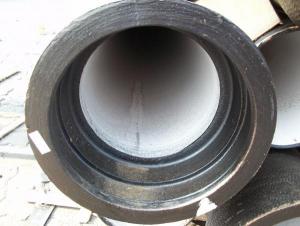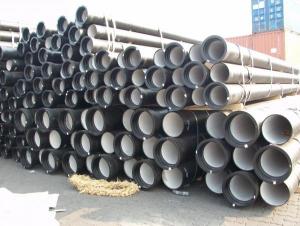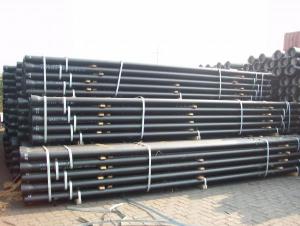Push On Joint T Type Ductile Cast Iron Pipe K9
- Loading Port:
- China main port
- Payment Terms:
- TT or LC
- Min Order Qty:
- 1 m.t.
- Supply Capability:
- 300000 m.t./month
OKorder Service Pledge
OKorder Financial Service
You Might Also Like
Product Name | Ductile Iron Pipe and Fittings |
Material | Ductile Iron |
Registered Brand | CMAX or CNBM |
Nominal Diameter | DN80 - DN2000mm |
Application | Water supply, Drainage, Civil Engineering,Construction & Housing, etc. |
Standard | EN545, EN598, ISO2531 |
Joint Type | T type, Flange type, Self-restrained type |
| Manufacture Standard | ISO 2531:1998/ EN 545:2006/EN 598:2007 |
| Coating Exterior | Zinc 130g/m2 according to ISO 8179-1 and bitumen coating 70 microns |
| Cement Interior | Portland Cement/ High Alumina Cement/ Sulphate Resisting Cement Lining according to ISO 4179 |
Company Information
CNBM INTERNATIONAL CORPORATION
Build your world with our materials.
We are a primary subsidiary of China National Building Material Group Co., Ltd.

CNBM Water Section is one of the pioneering suppliers of pipes, fittings and systems in China.
We are leading the market by supplying:Ductile iron water and sewer pipes, fittings, valves and couplings and adaptors
Ductile iron access covers and gratings.
Other types of pipes and fittings.
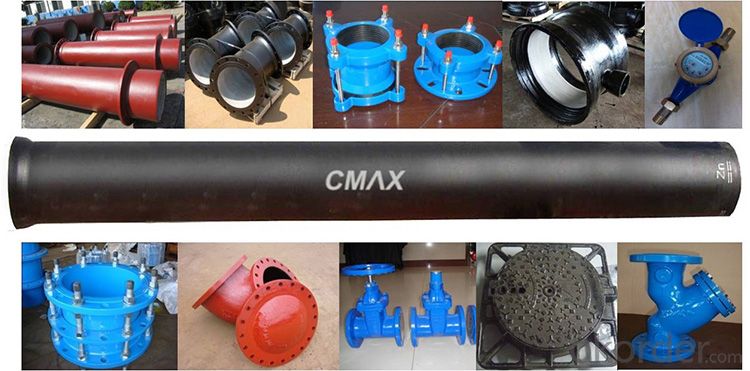
Push-on Joint T-type Joint
The T-type joint designs incorporate a single rubber sealing gasket assuring a tight, permanent seal. The "push-on" type joint is easy to assemble and fast to install. The push-on design eliminates the need for glands and fasteners. The rubber gasket fits inside the contour of the bell socket, which seats the gasket.The plain-end (spigot) of each pipe is beveled to further ease assembly.
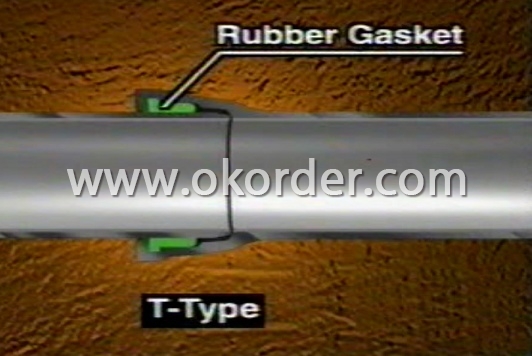
Certification
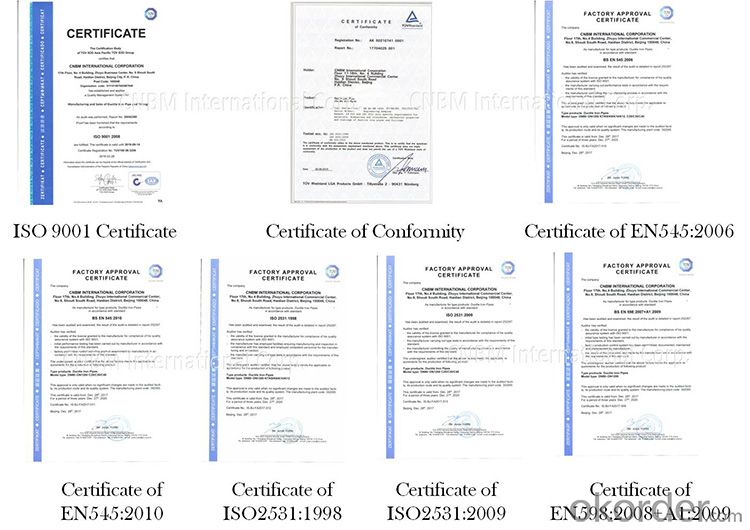
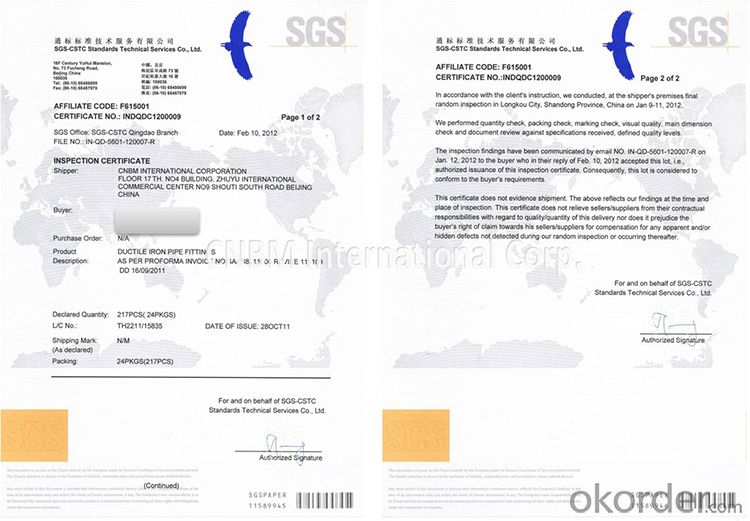
Package & Delivery
DN80-300: Packed in bundle
DN350-2000: Loose pack
Container loading
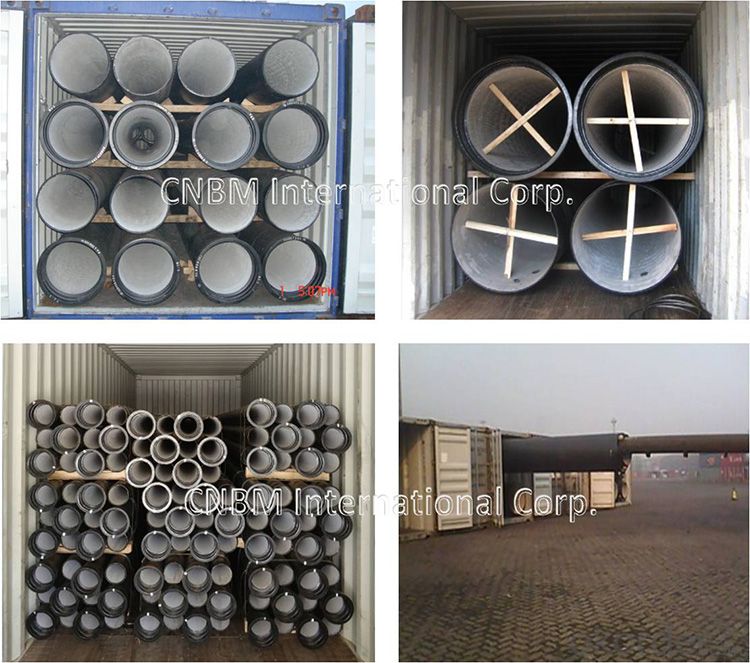
Bulk loading
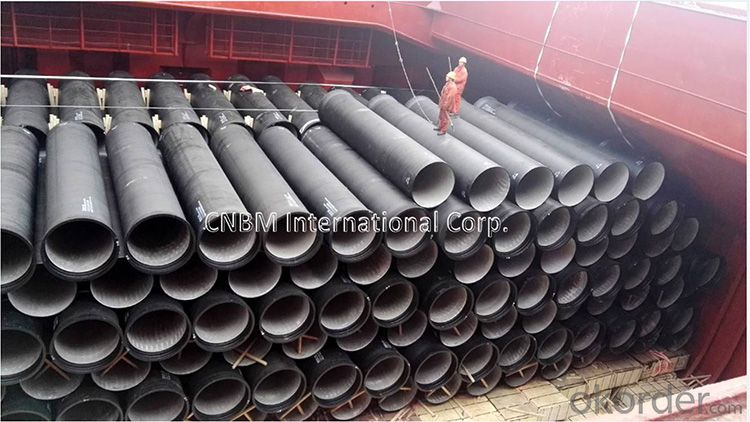
Related Projects
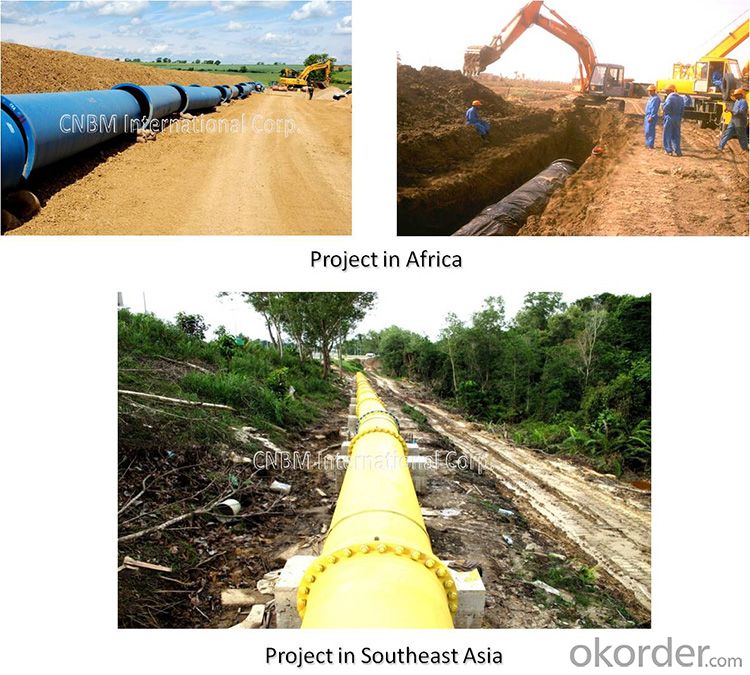
Why choose CNBM?
◆Government Credit
CNBM Intl is a primary subsidiary of CNBM Group, a Chinese central governmental enterprise. We’ve been accessed by D&B as Duns Registered 4A1 level since 2012, which endorsed us as one of the safest suppliers to work with in China.
◆Industry Leader
As an industry leader, CNBM Intl is also a top-ranking buyer of iron ore and coking coal in the world. Our raw materials’ cost and quality are under strict control from A to Z.
◆Strong Logistics Capability
1. Professional Logistics team
2. 20,000 containers + 30,000 M3bulk vessel per year = Cost-effective and Prioritized Shipments
3. 50000 M2 Dubai Logistics Park solely-owned by CNBM
◆VIP services
1. Professional Sales Team
2. Multi-language Sales Managers
3. One-to-One fast response
◆One-Stop Purchase Solution
Over 800 kinds of industrial products within CNBM product range.
Our factory
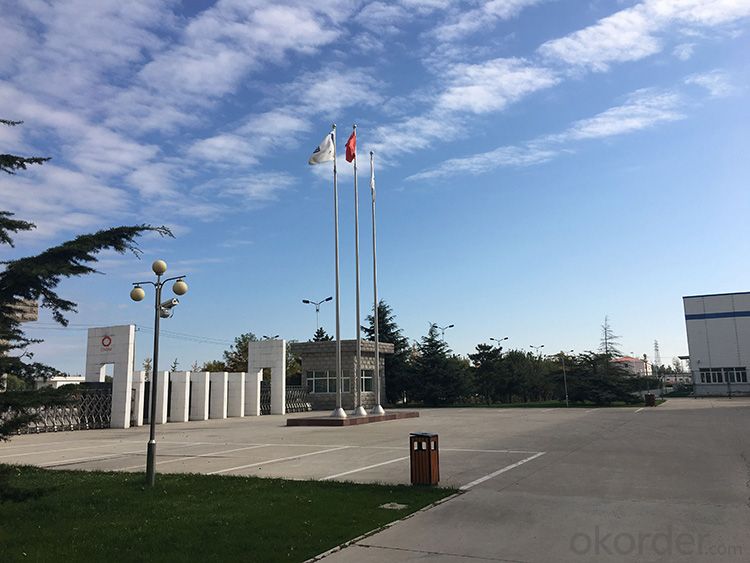
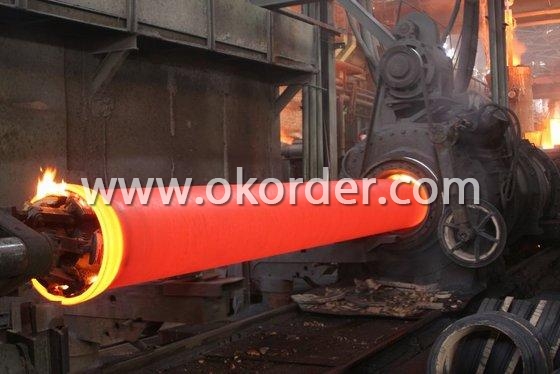
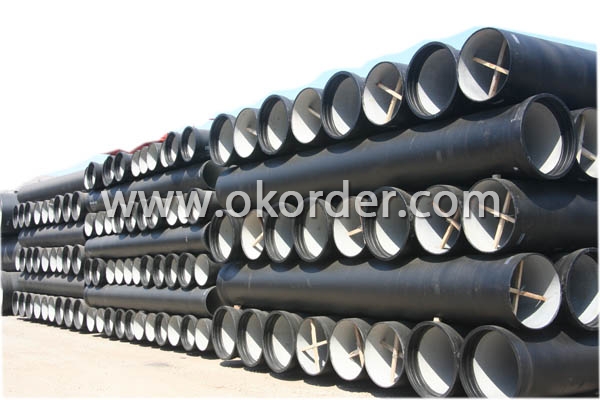
Our Services
◆Usually you can get our quotation within ONE day. In particular cases, we are committed to providing it within 48 hours.
◆Total technical supports from our senior consultant engineers.
◆Timely & Cost-efficient delivery.
◆Real time information of Chinese market.
◆Special discounts and protective policies provided to our distributors/partners.
FAQ
Q:Are you a trading company or manufacturer?
A:CNBM is a large-scale central governmental industrial group with its own manufacturing sector, research and development sector, trading sector and logistics sector.
Q:I have some special requirement about specifications.
A:We have a well-rounded product range, which endows us with the capability of applying many special specifications. Please feel free to contact us with yours.
Q:Do you accept OEM service?
A:Yes, we do.
Q:What is your delivery time?
A:It depends on the size/complexity of your order and our own production schedule. Usually we provide a faster delivery than the industry’s average.
Q:What is the payment term?
A:Our payment terms are negotiable.
Q:Can I have my own logo on the product?
A:Sure, we can apply your own logo on the products according to your drawings.
Q:Can I get samples?
A:Yes, you can. And you only need to bear the delivery costs, if the samples are not too big.
Q:How is your company's experience?
A:We have an over 20 years of experience in water industry and been exporting to over 56 countries. We cherish our reputation as a company and our customers love us.
Q:Can I request to change the form of packaging and transportation?
A:Sure, we’re glad to fulfill your requirement. Yet please understand that extra costs may occur if the form of packaging and transportation are changed.
- Q:How is ductile iron pipe tested for quality?
- Ductile iron pipe is extensively tested for quality to ensure its performance and reliability in various applications. The testing process involves several steps to assess the physical and mechanical properties of the pipe. One of the primary tests conducted on ductile iron pipe is the hydrostatic pressure test. This test involves subjecting the pipe to fluid pressure higher than its designed operating pressure to determine its ability to withstand internal pressure without leakage or failure. The pipe is filled with water or another suitable fluid, and pressure is gradually increased to the required level. The pipe is inspected for any signs of leakage or deformation during this test. Another crucial test is the tensile strength test, which measures the pipe's ability to resist pulling or stretching forces. A sample of the pipe is pulled until it breaks, and the maximum force applied during the test is recorded. This test helps determine the pipe's ultimate tensile strength, yield strength, and elongation properties. Ductile iron pipe is also tested for its impact resistance through the Charpy test. This test involves striking a notched sample with a swinging pendulum to measure the amount of energy absorbed by the pipe. It helps assess the pipe's ability to withstand sudden impacts or loads without fracturing. Additionally, the pipe undergoes various non-destructive tests, including ultrasonic testing, magnetic particle inspection, and visual inspection. These tests help detect any internal or external defects, cracks, or abnormalities that may affect the pipe's structural integrity. Furthermore, chemical analysis and metallographic examination are performed to evaluate the chemical composition and microstructure of the ductile iron pipe. These tests ensure that the pipe meets the required specifications and standards for its intended application. Overall, the testing process for ductile iron pipe is comprehensive and rigorous, aiming to guarantee its quality, durability, and overall performance in delivering water, wastewater, or other fluids safely and efficiently.
- Q:Are ductile iron pipes suitable for use in wastewater treatment plants?
- Yes, ductile iron pipes are suitable for use in wastewater treatment plants. Ductile iron has excellent corrosion resistance, high strength, and durability, making it ideal for handling the harsh and corrosive environment found in wastewater treatment plants. Additionally, ductile iron pipes have a long lifespan and can withstand the high-pressure demands of wastewater systems, making them a reliable choice for this application.
- Q:Are ductile iron pipes suitable for mining applications?
- Ductile iron pipes are indeed suitable for mining applications. This type of cast iron has undergone treatment to enhance its strength, durability, and ductility. Notably, these pipes possess high tensile strength and corrosion resistance, making them an ideal choice for underground mining operations that face harsh conditions. The ability of ductile iron pipes to withstand high pressure and heavy loads is one of their key advantages in mining applications. They exhibit excellent structural integrity and can withstand both internal and external forces, ensuring reliable performance in demanding mining environments. Moreover, ductile iron pipes have a long service life and require minimal maintenance. They offer exceptional resistance to abrasion, which is extremely important in mining operations where abrasive materials such as rocks, minerals, and ores are prevalent. Additionally, the smooth inner surface of these pipes minimizes friction, allowing for efficient transportation of mining materials. Furthermore, ductile iron pipes are a cost-effective option compared to alternatives like steel or concrete. They have a lower upfront cost and require less frequent replacements, resulting in reduced long-term expenses for mining companies. In conclusion, ductile iron pipes are highly suitable for mining applications due to their strength, durability, resistance to corrosion and abrasion, long service life, and cost-effectiveness. These pipes ensure reliable and efficient transportation of mining materials, thereby contributing to the overall efficiency and productivity of mining operations.
- Q:Can the sealing ring of ductile iron pipe be reused?
- The sealing ring is hard to install and take off. I have been in this line for six years. I haven't seen it removed. The rubber ring itself is not expensive. It is not necessary to reuse it.
- Q:How do ductile iron pipes handle pipe deflection?
- Ductile iron pipes are known for their exceptional strength and flexibility, which allows them to handle pipe deflection effectively. Pipe deflection refers to the bending or curving of a pipe from its original straight alignment. When subjected to external forces, such as soil movement or heavy loads, ductile iron pipes have the ability to flex and adjust without fracturing or breaking. This is due to their unique composition, which includes nodular graphite inclusions that provide excellent ductility. The flexibility of ductile iron pipes enables them to absorb and distribute stress evenly along the pipe wall, preventing concentrated points of strain that could lead to failure. This characteristic allows the pipes to accommodate ground movement, settlement, and other external factors that may cause deflection. Additionally, ductile iron pipes have a high modulus of elasticity, which means they can withstand significant deformation before reaching their ultimate limit. This property allows the pipes to maintain their structural integrity even when subjected to substantial deflection. Furthermore, the joint system used in ductile iron pipe installations contributes to their ability to handle pipe deflection. The restrained joint design ensures a tight and secure connection between pipe sections, reducing the potential for joint separation or leakage under deflection-induced stress. Overall, ductile iron pipes have excellent resistance to pipe deflection. Their flexibility, high modulus of elasticity, and reliable joint system make them a preferred choice for various applications, including water distribution, wastewater management, and sewer systems.
- Q:Do ductile iron pipes require external protection against stray electrical currents?
- Ductile iron pipes indeed necessitate external safeguarding against stray electrical currents. The presence of such currents can induce corrosion in the pipes, resulting in premature failure and probable leakage. To counteract this, protective coatings or wraps are employed on the ductile iron pipes, creating a shield between the pipes and the electrical currents. This safeguarding measure guarantees the durability and dependability of the pipes, warding off expensive repairs and potential safety risks.
- Q:Can ductile iron pipes be used for underground fuel storage systems?
- Yes, ductile iron pipes can be used for underground fuel storage systems. Ductile iron is a type of cast iron that possesses superior strength, durability, and flexibility compared to traditional cast iron pipes. These properties make ductile iron pipes suitable for various applications, including underground fuel storage systems. Ductile iron pipes are resistant to corrosion, which is essential for underground storage systems that may come into contact with various fuels and chemicals. Additionally, their high tensile strength and resilience allow them to withstand external pressure and loading, ensuring the integrity and safety of the underground storage system. Furthermore, ductile iron pipes have a long lifespan, typically lasting for several decades, making them a cost-effective choice for underground fuel storage systems. They can handle the weight of the stored fuel and any potential ground movements, maintaining the structural integrity of the system over time. However, it is important to note that the suitability of ductile iron pipes for underground fuel storage systems may also depend on other factors, such as local regulations, soil conditions, and the specific fuel being stored. It is always recommended to consult with professionals and adhere to applicable guidelines when designing and installing such systems to ensure compliance and safety.
- Q:How can the ductile iron pipe depress the elbow so as to prevent it from being opened?
- Elbow materials are cast iron, stainless steel, alloy steel, malleable cast iron, carbon steel, nonferrous metals and plastics.
- Q:What are the different methods for repairing ductile iron pipe?
- There are several methods available for repairing ductile iron pipes, depending on the extent and location of the damage. One common method is the use of repair clamps or couplings. These are designed to provide a temporary or permanent solution for leaks or cracks in the pipe. Repair clamps are typically made of stainless steel and are fitted around the damaged area, sealing it off and preventing further leakage. Another method is the use of epoxy lining or patching. This involves applying a specialized epoxy material to the inside of the pipe, which forms a protective barrier over the damaged area. This method is often used for smaller cracks or leaks and can provide a long-lasting solution. For more extensive damage, such as large cracks or fractures, the damaged section of the pipe may need to be cut out and replaced. This process typically involves excavating the area around the damaged pipe, removing the damaged section, and installing a new piece of ductile iron pipe. In some cases, trenchless repair methods may be used. This involves using advanced techniques such as pipe bursting or cured-in-place pipe lining to repair the pipe without the need for extensive excavation. These methods can be more cost-effective and less disruptive compared to traditional repair methods. It is important to note that the specific method chosen for repairing ductile iron pipes will depend on factors such as the extent of the damage, the location of the pipe, and the available resources and expertise. Consulting with a professional pipe repair service is recommended to determine the most suitable method for a specific repair situation.
- Q:How do ductile iron pipes handle ground movement or settlement?
- Ductile iron pipes are renowned for their remarkable strength and flexibility, enabling them to effectively manage ground movement or settlement. Ground movement or settlement pertains to the natural shifts or settling of the earth's surface, which can exert stress on subterranean infrastructure such as pipes. Concerning ground movement, ductile iron pipes possess the advantage of enduring and absorbing the pressure and movement caused by shifting soil. The material's ductility permits the pipes to flex and bend to a certain extent without fracturing. This flexibility aids in distributing the load and minimizing the potential for harm. Additionally, ductile iron pipes exhibit high resistance to cracking or fracturing, even under extreme circumstances. This resilience stems from the material's unique microstructure, which imparts excellent tensile strength and impact resistance. Consequently, ductile iron pipes can withstand external forces and ground settlement without compromising their integrity. To further augment their capacity to handle ground movement or settlement, ductile iron pipes are frequently installed using flexible joints. These joints allow for slight movement and accommodate any shifting or settling of the ground. Furthermore, proper bedding and backfilling techniques are employed during installation to provide added support and stability. Overall, ductile iron pipes possess a proven track record in managing ground movement or settlement. Their strength, flexibility, and resistance to cracking establish them as a dependable choice for subterranean infrastructure, ensuring the durability and efficiency of water distribution systems.
1. Manufacturer Overview |
|
|---|---|
| Location | Henan, China |
| Year Established | 1958 |
| Annual Output Value | Below US$1 Million |
| Main Markets | Mid East, Africa, South Asia, Eastern Asia |
| Company Certifications | ISO 9001:2008;ISO2531:2000 |
2. Manufacturer Certificates |
|
|---|---|
| a) Certification Name | |
| Range | |
| Reference | |
| Validity Period | |
3. Manufacturer Capability |
|
|---|---|
| a)Trade Capacity | |
| Nearest Port | Tianjin; Qingdao |
| Export Percentage | 1% - 10% |
| No.of Employees in Trade Department | 3000 People |
| Language Spoken: | English; Chinese; Spain; Alabic |
| b)Factory Information | |
| Factory Size: | Above 150,000 square meters |
| No. of Production Lines | Above 6 |
| Contract Manufacturing | OEM Service Offered; Design Service Offered |
| Product Price Range | Average |
Send your message to us
Push On Joint T Type Ductile Cast Iron Pipe K9
- Loading Port:
- China main port
- Payment Terms:
- TT or LC
- Min Order Qty:
- 1 m.t.
- Supply Capability:
- 300000 m.t./month
OKorder Service Pledge
OKorder Financial Service
Similar products
New products
Hot products
Related keywords
